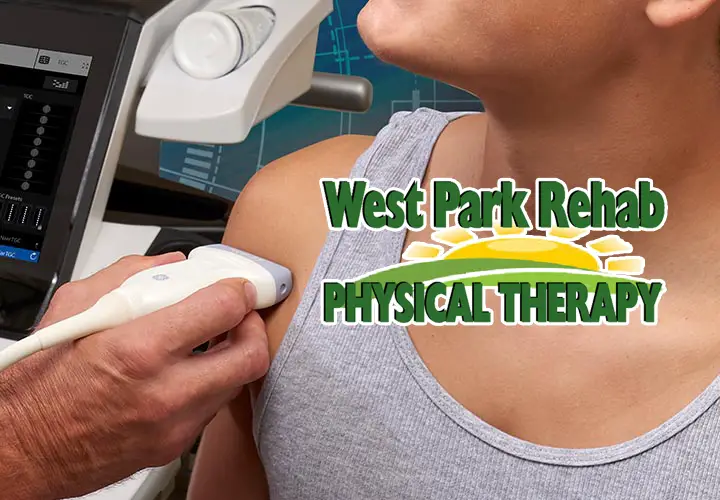 FRANKLIN, Pa. – The physical therapists at West Park Rehab help people with adhesive capsulitis address pain and stiffness and restore shoulder movement in the safest and most effective way possible.
FRANKLIN, Pa. – The physical therapists at West Park Rehab help people with adhesive capsulitis address pain and stiffness and restore shoulder movement in the safest and most effective way possible.
Often called a stiff or “frozen shoulder,” adhesive capsulitis occurs in about 2% to 5% of the American population. It affects women more than men and is typically diagnosed in people over the age of 45. Of the people who have had adhesive capsulitis in 1 shoulder, it is estimated that 20% to 30% will get it in the other shoulder as well.
The physical therapists at West Park Rehab are movement experts who improve quality of life through hands-on care, patient education, and prescribed movement.
Adhesive capsulitis is the stiffening of the shoulder due to scar tissue, which results in painful movement and loss of motion. The actual cause of adhesive capsulitis is a matter of debate. Some believe it is caused by inflammation, such as when the lining of a joint becomes inflamed (synovitis), or by autoimmune reactions, where the body launches an “attack” against its own substances and tissues. Other possible causes include:
- Reactions after an injury or surgery
- Pain from other conditions, such as arthritis, a rotator cuff tear, bursitis, or tendinitis, that has caused a person to stop moving the shoulder
- Immobilization of the arm, such as in a sling, after surgery or fracture
Often, however, there is no clear reason why adhesive capsulitis develops.
At West Park Rehab and Diagnostics, a musculoskeletal ultrasound can be used to visualize the tissues of the shoulder joint to help confirm the presence of frozen shoulder as well as rule out the presence of other problems like a tear in the rotator cuff tendons.
Stage 1: “Prefreezing”
During stage 1 of its development, it may be difficult to identify your problem as adhesive capsulitis. You’ve had symptoms for 1 to 3 months, and they’re getting worse. Movement of the shoulder causes pain. It usually aches when you’re not using it, but the pain increases and becomes “sharp” with movement. You’ll begin to limit shoulder motion during this period and protect the shoulder by using it less. The movement loss is most noticeable in “external rotation” (this is when you rotate your arm away from your body), but you might start to lose motion when you raise your arm or reach behind your back. Pain is the hallmark feature of this stage; you may experience pain during the day and at night.
Stage 2: “Freezing”
By this stage, you’ve had symptoms for 3 to 9 months, most likely with a progressive loss of shoulder movement and an increase in pain (especially at night). The shoulder still has some range of movement, but it is limited by both pain and stiffness.
Stage 3: “Frozen”
Your symptoms have persisted for 9 to 14 months, and you have a greatly decreased range of shoulder movement. During the early part of this stage, there is still a substantial amount of pain. Toward the end of this stage, however, pain decreases, with the pain usually occurring only when you move your shoulder as far you can move it.
Stage 4: “Thawing”
You’ve had symptoms for 12 to 15 months, and there is a big decrease in pain, especially at night. You still have a limited range of movement, but your ability to complete your daily activities involving overhead motion is improving at a rapid rate.
West Park Rehab has been successfully treating frozen shoulders for over 20 years. Help is available.
To request an appointment, visit https://sites.webpt.com/1660/reactivation-offer.
Check out West Park Rehab Physical Therapy/Diagnostics’ website at https://westparkdiagnostics.com for more information or call their office in Franklin at 814-437-6191 or Seneca at 814-493-8631.

Copyright © 2024 EYT Media Group, Inc. All rights reserved. Any copying, redistribution or retransmission of the contents of this service without the express written consent of EYT Media Group, Inc. is expressly prohibited.









